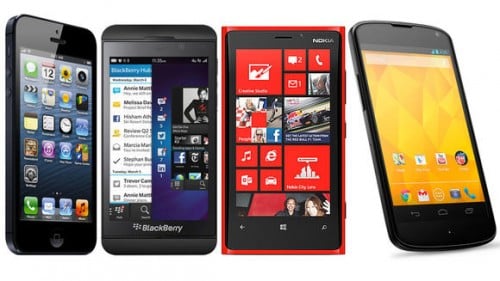Reading over Carly’s post and the comments made something clear to me – plenty of people have at least a vague sense of dissatisfaction with pretty much ALL of the available smartphone choices. iOS is ‘stale’, Android remains klunky, Blackberry is dead-end, and Windows Phone is the also-ran that just can’t seem to win. Many polls suggest general dissatisfaction with all current smartphone brands. Yet when you read about smartphone loyalty, Apple leads the way and in general most people are likely to stick with the brand and operating system they currently use. Which leads to the obvious question … WHY? There are four main reasons I can think of, let’s take a look!
- Inertia: think about it – do you REALLY want to learn a new OS, re-purchase apps, figure out how email works on THIS phone, deal with all the quirks (like iMessage) and so on? Most people who are not ‘cutting edge techies’ do not find much joy in relearning ‘tools’, they just want to get stuff done. How is this changing? Because now we have phones that do more things with more options than ever before, and how one phone does it can be very different than doing it on another phone – and require you to set up accounts on a variety of systems, and more.
- Carrier Dominance: In perhaps a half-dozen major cities there is TRUE choice of carriers, in a couple dozen or so more there is the binary AT&T/Verizon choice … but for the majority of folks there is a single dominant choice. For our area the choice is between Verizon, crappy reception and dropped calls. Extend this to a family located in several states, and you have a recipe for carrier compromise that will almost surely lock you into a single-carrier for the long haul.
- Ecosystems: both iOS and Android app stores have been around for nearly five years, and most of us have accumulated hundreds (if not thousands) of apps on one of the platforms. Rebuilding a library on a new app store is a huge task that isn’t even remotely fun or rewarding, especially since so many apps have different quirks or features or interactions and so on. And as Bryan reminded us in the comments of Carly’s post, while there are plenty of free apps, you could easily have spent thousands of $ assembling your current app line-up … do you really want to do THAT again?
- Family Harmony: after more than four years of being Android-only for phones, I cannot see myself switching away from iOS anytime soon. Of course we already had a Mac and a variety of iPods and iPads, but it was getting the whole family iPhones that has done it. We iMessage all the time, and I use FaceTime regularly when traveling. More than that, when traveling there is no cell access from work, so I depend on iMessage over WiFi for during-the-day text messages. And FaceTime in the evenings. Also, my mother recently got an iPhone, adding to my brother and his daughter also on iPhones. And everyone in our extended family uses Verizon regardless of OS … making mobile-to-mobile calls free (important between my wife and her sister!).
As a result we hear tech pundits talking about ‘what Apple needs to do … or else’ every year (or month), and others calling Microsoft or Blackberry or Nokia ‘dead’, or lamenting Android fragmentation – and always talking about the dire consequences as people jump ship from one platform to the other. And then it doesn’t happen – or at least not in the way pundits seem to state. Sure the landscape has changed – iOS and Android account for >90% of mobile sales worldwide, with the split varying by territory. Blackbery has been in freefall as companies have made moves to replace the service, and Windows Phone has been slow on the uptake meaning that corporate systems using Windows Mobile have slowly eroded that market share.
If you go back to the pre-iPhone days when folks had a ‘Verizon’ phone made by somebody, you would enter the store every 20 months and get a new phone. It didn’t matter if you had a Samsung and now wanted a LG or HTC – the sales person did a backup and restore and your contacts were all set. Existing things like ringtones, messages and so on … didn’t transfer normally. But with smartphones things are different … and more of a pain, sometimes to the point of not being worth doing.
What is your experience with people switching mobile OS makers? Specifically those who are not on the bleeding edge of technology?
